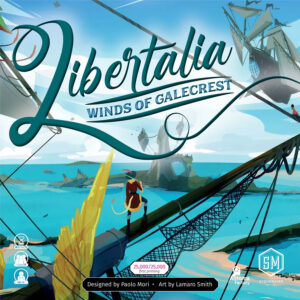 The year was 2015. The date was August 1. The time was 1:53 p.m. (I don’t actually have a record of the time. I’m just setting a mood. Go with it.) I had been pretty deep into the hobby for a few years at that point and would still frequently browse the internet for good deals to fill out my collection. During a large game sale at an even larger online retailer, there was one game that caught my eye. It was pirate-themed and had its players jockeying for position to claim the best treasures. It looked interesting and, after allowing three-to-five business days for shipping, I was holding Libertalia in my hands.
The year was 2015. The date was August 1. The time was 1:53 p.m. (I don’t actually have a record of the time. I’m just setting a mood. Go with it.) I had been pretty deep into the hobby for a few years at that point and would still frequently browse the internet for good deals to fill out my collection. During a large game sale at an even larger online retailer, there was one game that caught my eye. It was pirate-themed and had its players jockeying for position to claim the best treasures. It looked interesting and, after allowing three-to-five business days for shipping, I was holding Libertalia in my hands.
Paolo Mori’s design hadn’t left my collection since that fateful August day. It survived more than a few of my purges, including the Great Board Game Dump of 2017, where so much of my cardboard went to a better place.
Now seven years later and a full ten after its initial release, the long out-of-print game has been revamped, upgraded, and given the full Stonemaier treatment. Libertalia: Winds of Galecrest is a new game that uses the core concepts of its predecessor as a launching point for new mechanisms, new balancing, and even some new species for the pirates.
While I’ll mostly be judging Libertalia: Winds of Galecrest on its own merit, I will spend some time looking at how it sizes up to the original. Also—and this is important—I promise not to make a single pirate joke over the course of this review.
Gameplay Overview:
Libertalia: Winds of Galecrest is an action selection game for one to six players in which each player has the same set of six characters at their disposal at the start of the game. The six starting pirates are selected randomly from the game’s 40 potential characters, and players will see 12 more over the course of the game. Every character has a unique rank (i.e., a number between 1 and 40) and some type of special ability, which are broken into four types: Daytime, Dusk, Night, and Anchor.
• Daytime abilities trigger when the characters are on the Island, but before treasures are selected.
• Dusk abilities happen in the middle of a turn as players select their treasures.
• Night abilities happen at the end of every turn where that character still resides on your ship, which is a fancy way of saying “the table in front of you.”
• Anchor abilities occur at the very end of each round so long as the character is on the table in front of you, which is a less-fancy way of saying “on your ship.”
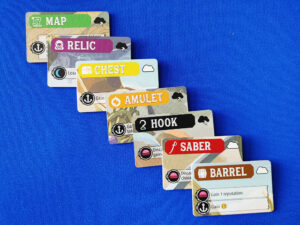
At the start of each voyage (round), loot tokens are laid out onto slots on the board. There are seven types of loot tokens, each with a different use or monetary value. One of the tokens is a relic and it’s the only purely “bad” one, although there are characters that might pop up who can use them in creative ways to get doubloons (the game’s scoring mechanism).
Players will then play a single character from their hand every day (turn) to try to claim a loot token. Once played, all the characters will be put in numerical order on the Island board and will activate their Daytime abilities in this order. Obviously, these abilities vary greatly since there are 40 characters, but often they involve moving around the location of the characters or loot tokens or instantly granting doubloons.
So why would you ever play a higher ranked character if the lower ranks can impact the game state first? I’m glad you asked. After all the Daytime powers have triggered, it’s the higher ranked pirates who get first dibs on the loot tokens. (Like how your boss always gets the first piece of cake during the office birthday parties. Seems unfair, but it’s simply the way of the world.) That is, of course, so long as the higher-ranked characters haven’t been kicked off the ship by a devious crewmember during the daytime.
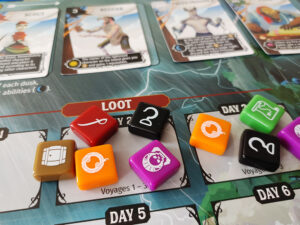
Since all players will hold the same group of cards, ties will occur regularly, and these are broken by the game’s reputation track. Throughout the game, certain characters can influence this track both positively and negatively to improve their standing. This is a key element of the game since breaking ties in your favor can be the difference between a chest of gold and a cursed relic.
The game is played over three voyages, each of which has an increasing number of days and therefore loot tokens. After each voyage, players will add up the doubloons they have collected (stolen, I guess?) and log in onto their score tracking treasure chest dial device. At the end of the game, whoever has accumulated the most money is the best pirate in all of the seven seas. (Or seven skies, I suppose. The theme of this one seems to involve flying ships that only occasionally hit the water. Also: nearly every crewmember in the game is an anthropomorphic animal. Did I forget to mention that?)
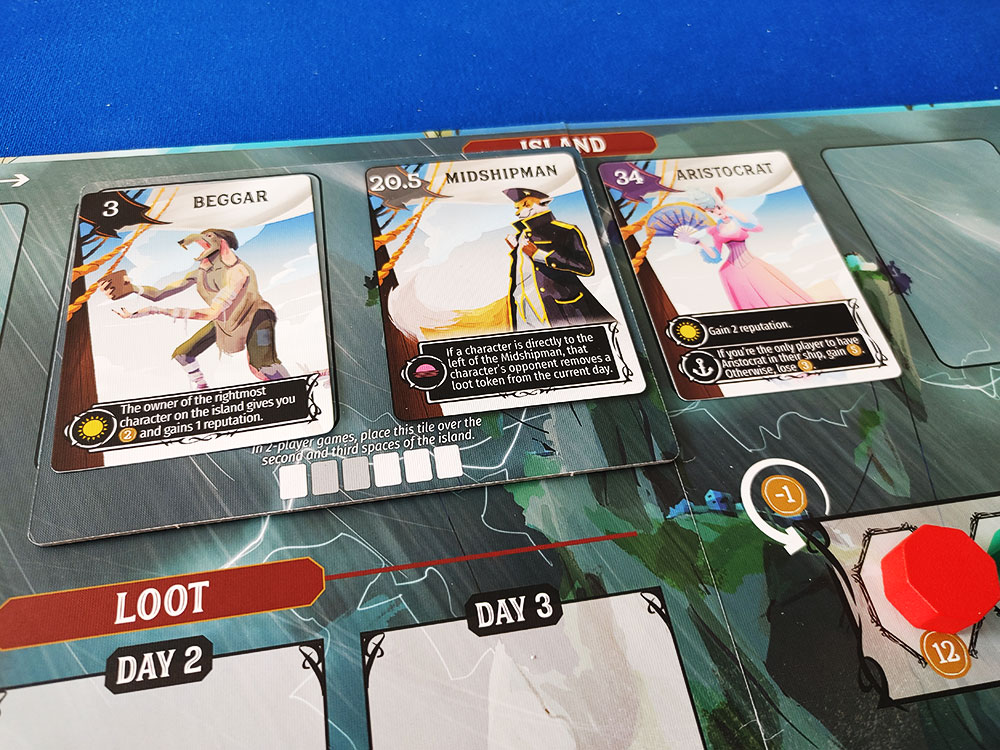
Game Experience:
The simplicity in the design of Libertalia: Winds of Galecrest belies the depth of strategy inherent in the game. Players can never be totally confident that playing the highest-ranking pirate from their hand will get them the best loot token. Also complicating things is that players know what cards everyone else has access to, so the game becomes a mind game of anticipating the moves of others. “I know that they know that I have the card that they think I know that they’ll play.” That is often where most of the fun in the game is: The intricacies of predicting the plays of others and doing one’s best to undermine it.
This also extends to the reputation track, which adds a layer of positioning that was absent from the original Libertalia. (I’ll expand on this more in my comparison section later.) If a player has a lower reputation, they know that they won’t win a tie for the treasure. So should they still take the risk and play the top-ranked Governor even though they will lose a tie? Or maybe they should just rely on the abilities of the crewmembers who rank lower to get a guaranteed reward?
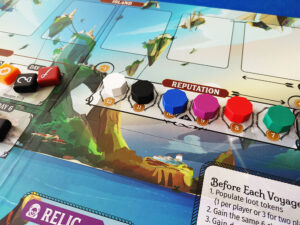
It’s an exciting mix of simplicity and complicated decision-making that makes the game fun during the action selection phase. And then, often, there’s a real dose of chaos at higher player counts because the available loot and order of the characters can change quite a lot during the Daytime phase. I suppose this might be frustrating to some looking for a way to select their path and stick to it, but in a game where jockeying for position on a single ranked track every turn is the only way to score, you have to expect some shenanigans. It’s definitely a feature of the design and not a flaw.
The original Libertalia has long been my favorite action selection game so I was eager to get the new version to the table and I can happily say that nearly every aspect of Winds of Galecrest is superior to the original. The only thing that isn’t obviously better is the art and—given the subjective nature of art—even that’s debatable. (I personally prefer the original’s photorealistic character art by Ben Carre and Stephane Gantiez, but Lamaro Smith’s fantasy artwork here is also exceptional.)
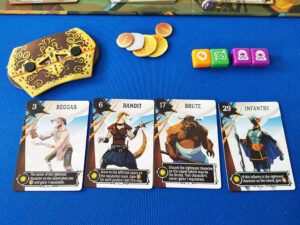
The loot tokens are not only upgraded in terms of component quality, but also because they now have multiple ways to play with them, which helps variability. Adding more characters (and tweaking some originals) also improves overall replay value.
The real game-changer is the reputation track, which fixes the tiebreaking rules from Libertalia. (Basically, each group of characters in the original game had a predetermined tiebreaker number. These numbers were apparently balanced, but in practice it made breaking ties anticlimactic and felt very arbitrary with no way to influence it.) The reputation mechanism is my favorite part of the new game.
One thing Paolo Mori worked on improving for this release was the two-player game, which was somewhat bland in Libertalia. And… it’s fine. Definitely better. I’m glad it was tweaked. The two-player game now adds a mid-ranked character who’s always on the Island for players to compete with. This two-player mode is certainly an improvement but still isn’t terribly robust.
In related news: I enjoyed the solo mode a lot more than I expected to. To summarize it briefly: A solo player plays the normal game against two automated opponents, one who plays randomly and one who targets specific loot tokens each turn based on the back of the top card of Automa draw deck. It’s pretty inventive and simulates a game at a low player count remarkably well.
Final Thoughts:
Even without an original game to compare it to, Libertalia: Winds of Galecrest is an exceptional production. It plays quickly and is a lot of fun at all player counts. (It goes up to six players, which is always nice for a larger game night.) In a way, it’s difficult to explain why Libertalia: Winds of Galecrest works as well as it does and sometimes that’s the secret to a game’s success. It’s fast, fun and sure to entertain players no matter what type of gamer they ARRRRRRR. (Fine. One pirate joke. I couldn’t resist.)
Final Score: 4.5 Stars – With top-notch production values and straightforward mechanics, Libertalia: Winds of Galecrest is an outstanding game with loads of replayability.
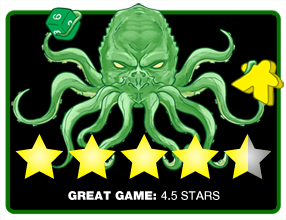 Hits:
Hits:
• Reputation track is a great way to break ties
• Variability of loot tokens
• Goes up to six players
• (Surprisingly) Strong solo mode
• Great art and graphic design
Misses:
• Two player game is just okay




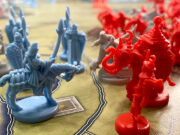
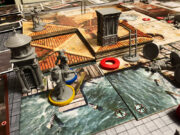
















In some Stonemaier games, you could add an automa as a third player for a two player game. Would that work in this case for two people wanting an additional opponent?
This is a fair question. Functionally, I think it could work since the way the (dual) Automa takes its turns is very straightforward, although there would need to be some tweaking of the language in the Automa deck to determine which player was being targeted. I did enjoy the two-player game as included, but the game is definitely a better experience at the other player counts (including solo).
I have the original game which I enjoy. Is this version enough of an upgrade to justify buying it? I like the art in the original version better.
For me, the gameplay changes are significant enough to warrant the purchase. There are not only more characters, but also more ways to play with the treasures and the Reputation Track is easily the best part of the revised ruleset for me. I understand there is a debate over the artwork, but even if you prefer the style from the original game, I don’t view it as a dealbreaker given how good this version still looks.
The art is so much better in this new version! So excited to finally play this game after year of searching for it online.